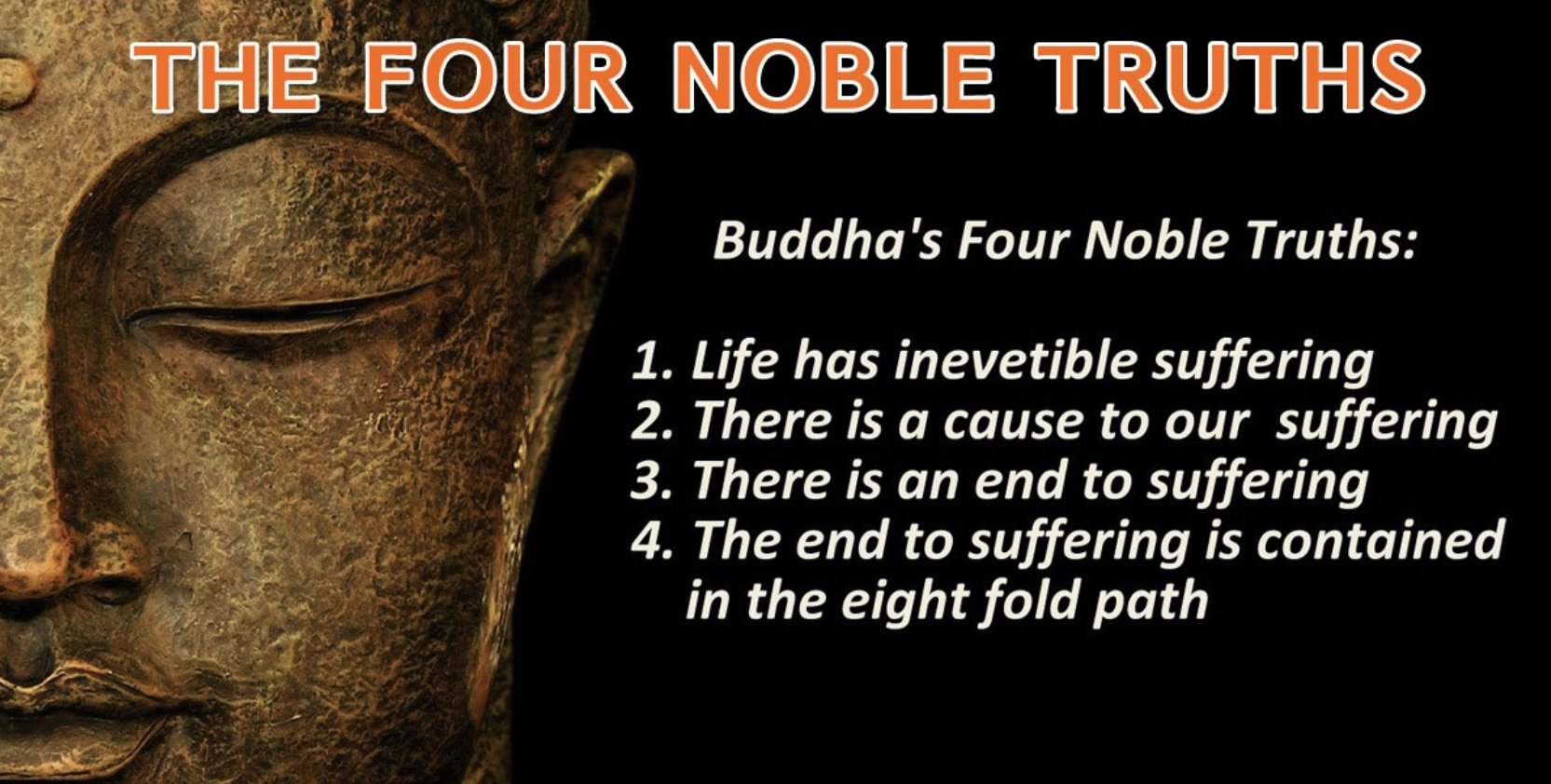Getting Philosophical— The Four Noble Truths: A Framework for Understanding Suffering in Modern Life
The timeless wisdom of the Four Noble Truths remains profoundly relevant, offering a roadmap to navigating the complexities of modern living. Whether you’re grappling with career stress, body image issues, or the endless pull of social media, these teachings help anchor us in presence and resilience.
The Truth of Suffering (Dukkha): Life is marked by suffering. In today’s world, this might mean managing imposter syndrome at work, facing the pressures of hyper-productivity, or dealing with loneliness in an age of constant connectivity. Recognizing that suffering is part of the human condition—not a personal failing—can be the first step toward addressing it with compassion.
The Truth of the Cause of Suffering (Samudaya): Suffering arises from craving and attachment. For the modern person, this might look like chasing perfection in a world obsessed with curated social media feeds or feeling unfulfilled because of unattainable beauty standards. Letting go of these external validations and focusing on what truly matters can dissolve much of this dissatisfaction.
The Truth of the End of Suffering (Nirodha): Liberation is possible. This doesn’t mean withdrawing from life’s joys but releasing the need for them to meet specific expectations. In daily life, this might look like finding peace in the middle of chaos—learning that a messy home or a missed deadline doesn’t diminish your worth.
The Truth of the Path (Magga): The Eightfold Path offers actionable steps for navigating modern life with mindfulness, integrity, and balance. From making ethical choices in consumption to practicing mindfulness during a hectic commute, this path helps align your actions with your values, leading to a more centered and purposeful life.
Pain, Yoga, and Transformation (Because Modern Life Isn’t Always Flexible, But You Can Be)
Yoga provides a powerful lens to apply these tenets, transforming how we relate to discomfort—physical, emotional, or mental.
Physical Pain: Many of us carry chronic tension, whether it’s from long hours at a desk or the physical manifestations of stress. Yoga helps alleviate these pains by bringing awareness to the body, encouraging mobility, and releasing tension. Studies have confirmed its effectiveness, with a 2020 meta-analysis showing significant reductions in chronic pain severity and improved quality of life. So, when you feel your shoulders tense after back-to-back Zoom calls, a few sun salutations might offer more than just physical relief.
Emotional Pain: The fast-paced modern world often leaves us emotionally stretched thin. Yoga helps regulate our nervous systems, calming the mind and making us more resilient in the face of life’s challenges. Even a few minutes of conscious breathing or meditation can shift your perspective, grounding you in the present moment rather than spiraling into “what-ifs.”
Learning to Enjoy Pain: In today’s culture, where instant gratification reigns, learning to sit with discomfort can feel revolutionary. Yoga teaches us to approach discomfort with curiosity rather than avoidance. Whether it’s holding a challenging pose or breathing through stress, this resilience carries over into daily life, helping us navigate setbacks with grace and grit.
The Art of Letting Go (Or: Why You Don’t Need to Chase Perfection to Thrive)
In modern life, letting go can feel like a superpower. Yoga and the Four Noble Truths both remind us to release what no longer serves us—whether that’s unrealistic expectations, toxic relationships, or outdated goals.
This practice also asks us to find joy in the unexpected. Maybe you stumble during a balancing pose and laugh, or maybe you surprise yourself by staying calm in traffic. Recently, I started using a Shakti Mat (not endorsed, just my personal experience). At first, lying on it felt like testing my limits (and sanity), but breathing deeply through the discomfort revealed profound relief. This small, daily ritual has taught me to soften into resistance and trust the process—a lesson that transcends the mat.
Whether you’re grappling with a metaphorical spike-covered mat or the pokes and prods of modern life, these practices help us cultivate presence in every moment, even the challenging ones.
Pain as a Portal to Joy in a Fast-Paced World
Modern life often tempts us to avoid discomfort at all costs, from numbing with screens to over-scheduling ourselves into oblivion. Yoga and mindfulness, however, teach us that pain isn’t an obstacle but a gateway to growth. By changing how we approach discomfort—whether in a tough yoga pose or a difficult conversation—we unlock deeper levels of resilience and joy.
This approach aligns with research on acceptance-based therapies like Acceptance and Commitment Therapy (ACT), which have shown that mindfulness and acceptance reduce emotional distress and increase flexibility—both mentally and physically. Whether it’s pushing through a workout or reframing a stressful day, this mindset can transform how you approach life’s challenges.
Conclusion: Laugh, Stretch, and Shine
The Four Noble Truths go beyond being a mere philosophical concept—they serve as a practical guide to navigating the complexities of modern life. By integrating yoga and mindfulness, these teachings become actionable tools, helping us approach challenges with self-compassion and transform ordinary moments into opportunities for growth and joy. Whether it’s finding calm in the chaos of a hectic day or celebrating small wins, these practices remind us that thriving isn’t about perfection—it’s about presence.
So, the next time you’re struggling with a pose, a tough day, or the weight of expectations, remember: discomfort isn’t a dead end. It’s a doorway. Step through it, breathe deeply, and trust that every stumble, stretch, and moment of stillness is part of your journey toward a richer, more joyful life.
References
Cramer, H., Lauche, R., Haller, H., & Dobos, G. (2020). “Yoga for Chronic Pain Conditions: A Systematic Review and Meta-Analysis.” The Journal of Pain.
Hayes, S. C., Strosahl, K. D., & Wilson, K. G. (2016). “Acceptance and Commitment Therapy: The Process and Practice of Mindful Change.” Cognitive and Behavioral Practice.
Kabat-Zinn, J. (2013). Full Catastrophe Living: Using the Wisdom of Your Body and Mind to Face Stress, Pain, and Illness.
